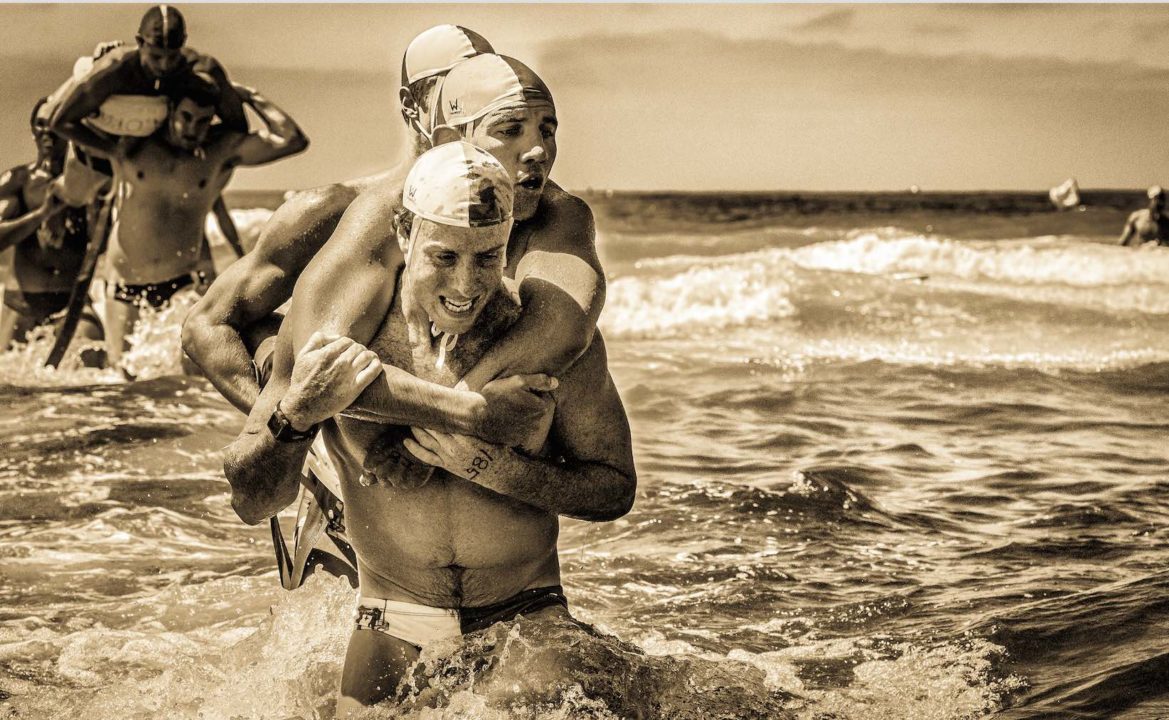With the world shutting down, we’re reaching into our archives and pulling some of our favorite stories from the SwimSwam print edition to share online. If you’d like to read more of this kind of story, you can subscribe to get a print (and digital) version of SwimSwam Magazine here. This story was originally published in the 2017 College Preview edition of SwimSwam Magazine.
Story by Philip Rogers.
One of the less memorable incidents in the life of Jersey Shore lifeguards during the summer of 1962 was a curious visit from AAU officials asking about which beach patrol members were college swimmers.
I was a distance freestyler for LaSalle College and was recruited to Stone Harbor Beach Patrol after being a guard in North Jersey for a couple of years, but there were almost no intrapatrol competitions. The South Jersey, aka “SoJers,” competition and rivalries are serious business, and championships are much prized for bragging rights in the beach houses. Around 1962, LaSalle College had six swimmers scattered through the beach patrols of South Jersey — Atlantic City, Stone Harbor, Wildwood, and Cape May.
The lesson is that small things often have major consequences, and while it can’t be verified now, the tale makes for interesting discussion.
The backstory: Avery Brundage, that scion of overprivilege and bigotry who headed the U.S. Olympic Committee, somehow decided that lifeguards were paid professionals and thereby ineligible for AAU, Olympic, and, by extension, NCAA competition.
At that time, the AAU was a hidebound organization of mostly wealthy so-called Mustache Petes, long gone from competing and in the last days of exercising control over all amateur athletics. But the NCAA and other federations were starting to challenge the AAU’s lock on all amateur sports.
I knew in the South Jersey beach patrols swimmers from West Chester, U. Penn, Delaware, and LaSalle. You could suspect the AAU had no idea about rowers like John Kelly (Ocean City Beach Patrol, South Jersey, and Olympic champion).
What may have drawn Brundage’s interest was the “Around the Island Swim” at Atlantic City, where there were cash prizes. Generally, guards/college swimmers who entered the race did so under someone else’s name. In 1963, I was Dennis Murphy.
No one is sure which beach patrol the worthies from AAU’s New York City headquarters arrived at first, but the great unanswered question remains: Who tipped them to go there?
Temple was just forming a team under Joe Verdeur at that time, so that was unlikely. St. Joe’s and Drexel had no teams, and the three major swim rivals were LaSalle, West Chester, and Villanova. Rutgers and Seton Hall had swimmers working North Jersey beaches, but the teams weren’t very competitive. The mainline mavens had no one working for lifeguard (aka pauper) wages riding the stands in those days, so the suspicion was always the Villanova coach. When asked years later, Ed Geisz vehemently denied having anything to do with that situation.
Stone Harbor’s first inkling about the matter was a phone call from Atlantic City B.P. headquarters alerting our captain that a couple of “suits” from AAU were asking questions about which guards were college swimmers and had been given no information. Our lieutenant came to each beach — there were no portable radios in 1962 — and we were told not to answer questions from anyone about college swimming, since the suits probably wised up and changed into more suitable summer clothes.
The next day, a couple of guys knocked on the beach-house door, introduced themselves, and were quickly told by the lieutenant to get out. They left in a huff, and phone calls were made to other nearby patrols. Eventually, we heard the next stop was Wildwood B.P., where the captain was of “Mediterranean descent” and had a notably short temper.
Words were exchanged, and when the persons of great importance from NYC arrived at their car, they were greeted by Wildwood Police Department officers, who told them to follow.
The car was escorted to the city line on Rio Grande Avenue, and the now chastened officials were given a short lesson in small-town justice, summed as: Don’t come back.
There was never an official statement about Brundage’s decision, but the college coaches knew that declaring every swimmer who was a lifeguard a professional would have decimated most teams, and the NCAA’s revolt against the AAU was given a major push into full gear.

Avery Brundage turned out to be a real beauty. My college roommate did his doctoral thesis on him in the early 70’s. A bigoted and cranky old man whose primary aim was to limit Olympic participation to the wealthy. Many books have since been published exposing his true character. He passed on as a very bitter and disillusioned old man. This is just another example of how he exploited his perceived power.
He is buried in Chicago. Legend has it every year on the anniversary of his death a Star of David is peed into the grass of his grave. Fitting for such a despicable person.
He was the KING of hypocrites. You can’t do this but I can. You can’t do that but I can. I think the older swimmers who read SS will remember a lot about his antics and feel the resentment swelling back up. He destroyed many great athletes because of his prejudices. I won’t say any more. My blood pressure is already starting to rise.
Good comment- a lot of people look ‘fondly’at the amateur era of sport without knowing the Olympics were set up to be amateur so only wealthy aristocrats, for whom sport was a pastime, could compete. Working class riff-raff who had to work for a living would be excluded, and they could not profit from their skills.